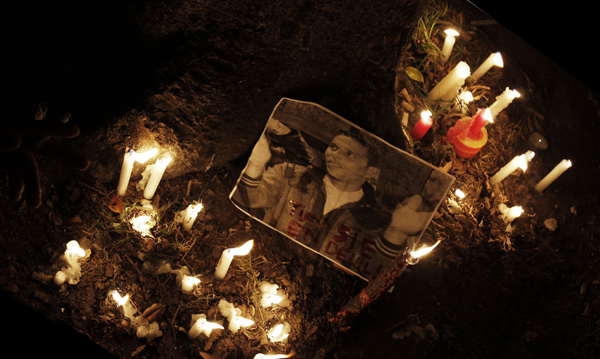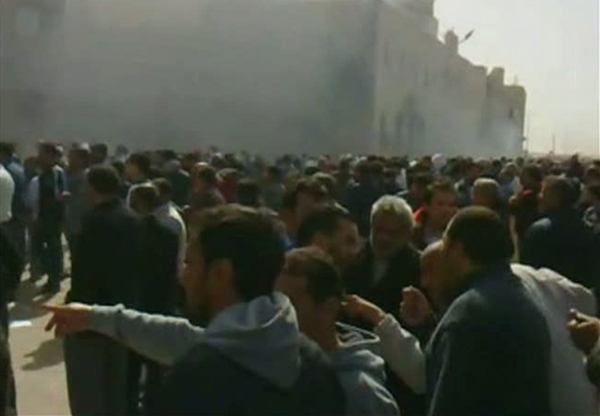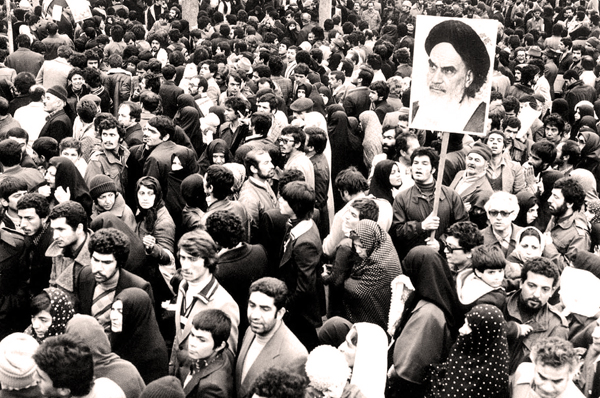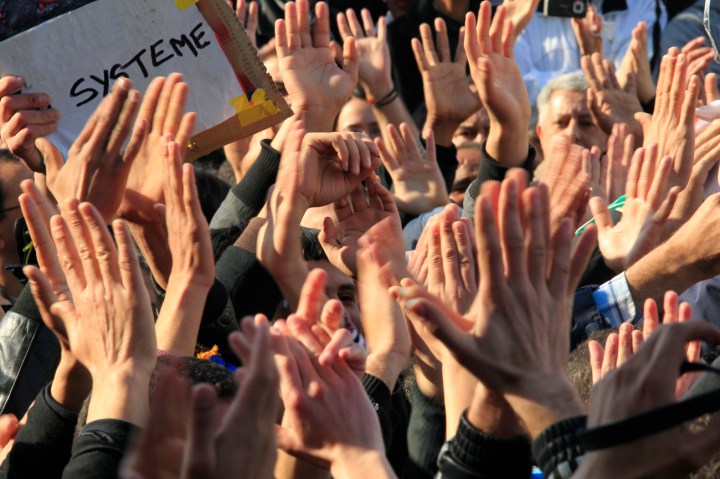No, we don’t mean “New World Order” in the Illuminati-Conspiracy theorists’ apocalyptic sense. Rather we mean the magnitude and extent of current events in the Maghreb and Middle East are already changing the way the world worked until several months ago. Now it is going to work differently. J BROOKS SPECTOR analyses recent events against historical backdrops.
Some day, students may take their graduation photos and newlyweds their wedding pictures in front of monuments to Mohamed Bouazizi in cities throughout the Middle East, as ubiquitous as busts of Lenin and those statues of the heroic peasants, workers and soldiers that used to occupy public squares across Eastern and Central Europe.
But, these monuments to Bouazizi will have been erected in the name of a better cause, the 21st century’s liberation from authoritarian government of a vast arc of territory stretching from the Atlantic Ocean to the Persian Gulf littoral. “Bouazizi?” you ask. He is the man who quite literally set the “Arab street” ablaze by his despairing suicide in Tunisia on 4 January 2011 – the precipitating cause being the eternal bureaucratic harassment he had endured in trying to carry out a fruit-and-vegetable peddling business.
By now, it has become almost impossible to keep track of all the incidents, major and minor, impacting on the high-speed kaleidoscope of events in that region.
First it was the end of Ben Ali’s government in Tunisia. Then it was Hosni Mubarak’s turn after three decades of sclerotic rule and two weeks of civil protests. More recently, protests have broken out in Bahrain, Iran, Jordan, Yemen, Algeria, Libya and now in Morocco as well. In some of these places, soldiers have fired on demonstrators, killing dozens. These deaths have created martyrs. Protests over these deaths have generated new protests and called forth more protesters. It is a cycle that should be familiar to any South African older than 30 and a student of history.
On 5 March 1770, Crispus Attucks, a former slave, was the first person to die in what became the American Revolution when a squad of British soldiers fired on a crowd in Boston, Massachusetts. Whether the crowd was hurling bricks and stones at the troops or whether peaceably assembling to express their grievances ultimately didn’t matter much. Attucks’ martyrdom – as portrayed in contemporary broadsides and breathless testimony in colonial newspapers – helped incite the American colonists to rebellion and that led to all the rest. This made Attucks the first victim of the “Age of Revolution” as revolts moved across Europe, South and North America for 50 years. The idea of revolution is spreading and permeating societies much faster now in the Middle East than it did in Crispus Attucks’ day.

Photo: Candles surround a picture of Mohamed Bouazizi, a vegetable seller who set himself alight on December 17 and ignited nationwide protests that forced ex-president Zine al-Abdine Ben Ali to flee the country, during a nighttime vigil in downtown Tunis, January 22, 2011. REUTERS/ Finbarr O’Reilly.
Then it was the printing press, the Sunday sermon and the sailing ship that spread societal “infection”, taking months and even years. Still such influences were profound. For example, Thomas Paine’s small pamphlets such as “The Crisis,” began with its famous introduction that: “These are the times that try men’s souls: The summer soldier and the sunshine patriot will, in this crisis, shrink from the service of their country; but he that stands it now, deserves the love and thanks of man and woman. Tyranny, like hell, is not easily conquered; yet we have this consolation with us, that the harder the conflict, the more glorious the triumph….”
It became universally available during the colonies’ revolt against Britain – and then widely read on the European continent as well. If “The Crisis” were sold today, it would have the impact of a blockbuster by Oprah Winfrey, John Grisham, Tom Clancy and John le Carré, all rolled into one. And documents like the American “Declaration of Independence” had their influence on revolutionary France as well as Ho Chi Minh’s Vietnam in 1945.
Visualise for a minute the extraordinary moments when Ho Chi Minh quoted Thomas Jefferson’s exact words in Hanoi’s Ba Dinh Square on 2 September 1945 as he declared Vietnam’s independence from France. Ho told his people, “All men are created equal. They are endowed by their Creator with certain inalienable rights, among them are Life, Liberty, and the pursuit of Happiness.” From America he moved to the French “Declaration of the Rights of Man.” Talk about memes reaching across the centuries.
Today, of course, the combination of words and images from satellite TV, cellphones, email, the Internet and digital social media has generated a stew of information and influence that has evaporated distance and allowed the memes of rebellion and economic and social change to leap from country to country in hours in a seemingly seamless flow.
But dig deeper and the events in the Middle East are not entirely spontaneous. Some protest organisers owe inspiration to American theorists of practical political action like Gene Sharp and Saul Alinsky, together with that unheralded Egyptian Google employee who helped get the word around town. The New York Times’ Sheryl Gay Stolberg has noted that although, “Few Americans have heard of Mr. Sharp…. his practical writings on nonviolent revolution — most notably ‘From Dictatorship to Democracy’, a 93-page guide to toppling autocrats, available for download in 24 languages — have inspired dissidents around the world, including Burma, Bosnia, Estonia and Zimbabwe, and now Tunisia and Egypt.
“When Egypt’s April 6 Youth Movement was struggling to recover from a failed effort in 2005, its leaders tossed around ‘crazy ideas’ about bringing down the government… they stumbled on Mr. Sharp while examining the Serbian movement Otpor (Resistance) [on the Internet], which he had influenced.”
Perhaps even more interestingly, Egypt’s Muslim Brotherhood, the religiously based opposition group, has posted Sharp’s book on its website.

Photo: A crowd gathers as smoke billows from a building purported to be the internal security headquarters in Libya’s second city of Benghazi in this still grab taken from video uploaded February 20, 2011. Reporters have not been allowed into Benghazi but piecemeal accounts suggest its streets are largely under the control of anti-government protesters, who periodically come under attack from security forces firing out of their high-walled compound. REUTERS/Youtube via Reuters TV
Of course, the rebellions of 2011 in the Middle East are not unique. There have been numerous waves of contagious revolutionary ardour beyond both the present moment or the 18th and 19th centuries’ “Age of Revolution.” In 1848, revolution spread quickly across Europe and put an end to monarchy in France, and nearly so in various other nations. Then, in the late 19th century, socialist-inspired anarchist movements assassinated various rulers to usher in a world revolution. Post-World War I, socialist republics, besides the obvious one in Russia, also sprang up temporarily throughout Central Europe in Hungary, Bavaria and Berlin.
Closer to our time, in 1968 -70, student movements pushed Charles de Gaulle out of power, pressed presidents Lyndon Johnson and Richard Nixon nearly to the wall, led to a period of protests throughout Europe and in China with that ever-present “Little Red Book”. And, of course, before satellite TV, cellphones and the Internet were communications standards, a largely peaceful movement carried Eastern Europe and East Germany out from under Soviet influence and caused the USSR to collapse. How much quicker might it have happened if those communications technologies had been available, instead of just some shortwave radio broadcasts from the West and the odd broadcast of western TV in East Germany. And, of course, Pope John Paul II’s liberation theology. (Yes, it does sound like an oxymoron – Ed.)
Historians and analysts are keen to point to the inevitability of these broad, international revolutionary cycles, after the fact. But, as Niels Bohr, Casey Stengel, Samuel L Goldwyn, Dan Quayle, Mark Twain, Albert Einstein, Winston Churchill, Groucho Marx and Woody Allen have all famously instructed, “prediction is hard, especially about the future”. In fact, six months ago, American President Barack Obama did ask US government analysts to evaluate the possibility of major unrest in the Middle East.
This “Presidential Study Directive” concluded that without major political changes, the region was ripe for revolt and Egypt was a likely flashpoint for unrest. But the report also struggled with how the US could push for reforms in countries that were valued allies, thereby framing the core dilemma: How to balance US strategic interests in the region and avoid greater instability even as the US voiced support for democratic reforms. That’s the tough one. CIA director Leon Panetta added that intelligence analysts had, in fact, predicted a lack of reforms could lead to instability, but they were unable to foresee what, precisely, might “trigger” the inevitable unrest. But that is the point about predictions, isn’t it?
Let me offer a personal reminiscence here. Way back in 1979, I had an energetic conversation over dinner with an American intelligence analyst about places such as Iran. (No, not a James Bond or Wild Bill Donovan type – he was wheelchair-bound, after all, and a desk jockey whose job it was to read and read and read, and then think and think and think.) His argument was simple: Iran’s ruler, the shah, had the army, all that money from oil and Savak, the country’s feared secret police. There would be some speed bumps in the road, but the shah would prevail. Fresh from assignments in Southeast Asia and Africa, my argument was also simple: Places like Iran with no tradition of democratic participation were like a dinner plate balanced on top of a pencil standing upright in the centre of the table. This was a stable system, but only as long as absolutely nothing jostled it.

Photo: Supporters of the leader and founder of the Islamic revolution Ayatollah Khomeini hold his picture in Tehran during the country’s revolution in February 1979. Reuters.
But, as everyone remembers, religious fervour, cassette-taped messages from the exiled Ayatollah, radical student protests against the regime and its American backer, plus popular revulsion against Savak all jostled. It seems that all the king’s horses and all the king’s men couldn’t predict this upheaval in advance either.
That’s the nub of the problem for any government trying to figure out where the Middle East rollercoaster is going next. The events in Egypt and Tunisia have upset a generation’s worth of assumptions.
Let’s start with the Israelis. Cairo’s aftermath may upset their entire geopolitical universe. Since 1979, when the peace accord meant the return of the Sinai Peninsula to Egypt after it had been lost to the Israelis in 1967, Israelis have come to believe that even though they live in a dangerous neighbourhood, their western flank was secure and they could save some quality time and energy for other areas.
The quid pro quo for the return of this territory was effective Egyptian demilitarisation of key Sinai strong points, freedom for Israeli seaborne transit through the Straits of Tiran (at least from the Egyptian side) at the southern tip of Sinai, Israeli-flagged ship access to the Suez Canal, and sometimes testy, not particularly warm, but actual diplomatic relations between Egypt and Israel. Moreover, it has also meant cooperation in dealing with the Palestinian enclave of Gaza, becoming especially important once Hamas took effective control of Gaza. This whole reflected an effective US-Israeli-Egyptian alliance that anchored the Middle Eastern strategic universe.
Now, all of these three-decade-old fixtures of the Middle Eastern strategic landscape may be in a state of flux. Yes, Egyptian military authorities have said they will continue to honour the Israeli-Egypt peace accord and Israeli access to the Suez Canal, just as the peace accord stipulates. But for the Israelis, the question is not, precisely, what the military says it will do over the short run. They are, after all, supposed to give way to a more democratically elected regime in six months or so – a regime whose policies have yet to be defined.
The outcome that undoubtedly troubles Israeli defence planners would be a new, more democratic Egyptian government that seeks to kindle a rebirth of Egyptian influence in the Arab world by renouncing the 1979 treaty officially, or even just inching away from it informally. But there are also the possibilities of continuing Egyptian instability or a weak, fractured government unable to prevent militant groups from attempting to provoke an Israeli response.
Or worse, consider the possibility that a Palestinian group might try to take advantage of a weak, unstable Egyptian government, to build up more vigorous support for Palestinians living in Gaza. Any of these outcomes would almost certainly trigger some sort of Israeli military response. At that point, the question becomes how to keep everyone off the escalator of an increasingly ugly sequence of events.
As ultimate realists, at least in the short term, most Israelis are probably hoping for the evolution of Egypt into a stable, military-dominated regime that focuses its energies on domestic economic development, rather than a 21st century version of Gamal Nasser’s transcendent Arab nationalism. Israeli defence minister Ehud Barak, in one of the few Israeli official comments on Egyptian developments so far, the other day said he wasn’t worried Mubarak’s departure would hurt Egypt-Israel relations. But that is a far cry from supporting the demonstrators with a ringing endorsement of greater democracy (but more uncertainty) or in spelling out precisely what the Israeli government hopes will occur in actual political outcomes.
Some people close to Israeli Prime Minister Benyamin Netanyahu have started to offer bleaker assessments, however. As The Economist reported: “People close to Mr Netanyahu mutter darkly about the ‘Hamas-isation’ of Egypt, a possibility that fills most Israelis, not just on the right, with dread. ‘Half of the Palestinian people have already been taken over by Iran’ says Israel’s prime minister, with barely a hint of conscious hyperbole.
“The Egyptian upset is heightening a sense of encirclement that has not been felt so acutely by Israelis in decades…. Meanwhile Iran itself, Israel’s biggest bugbear in the wider region and governed by a mercurial president fired with righteous anger towards Israel, moves steadily towards getting a nuclear weapon.
“Perhaps even more worrying for Israel is a rising fear that on its eastern flank the ruling monarchy in Jordan, the only Arab country bar Egypt that has a formal treaty with the Jewish state, is being shaken by an assortment of Islamists, tribal leaders, Palestinians (who make up a good half of Jordan’s people), disgruntled former security men and a middle class irritated by the royal family’s perceived extravagance.”
Of course helping influence the evolution of Egyptian domestic developments is almost certainly beyond Israel’s direct ability to achieve – despite the occasional wild statements heard in Cairo that Mubarak was a puppet of Israel (or America or both). More than a billion dollars in US military aid each year will get you some attention, if you are the US government, but that’s not Israel’s situation. And almost certainly there is an ongoing debate within the Israeli government about what kinds of actions on their part would provoke which outcomes; and perhaps recognition that any comments or actions run the risk of provoking the wrong result – from their perspective.
Taken together, this helps explain the public near-silence from the Israeli government so far. From the Israeli point of view, anything that increases uncertainty goes right back on to Israel’s “must-still-to-be-dealt-with” list, right along with Iran’s putative nuclear capabilities, the possibility of Syrian future nuclear efforts, the chances of yet another Palestinian intifada and the gradual impact of the West Bank’s demographic bomb. And, of course, the Israelis now find themselves watching the approach of two Iranian naval ships that apparently intend to transit the Suez Canal.
For the various Arab regimes, the stakes are surprisingly similar. To hold the forces of uncertainty and nemesis at bay, Jordan’s king has already replaced his cabinet to make peace with protesters. Long-serving Yemeni ruler Ali Abdullah Saleh has said he will not run for re-election, and Libya, Bahrain and Algeria’s governments have all put on serious shows of police strength against anti-regime demonstrators. In Benghazi, Sana’a, Algiers and Bahrain, there have been anti-government demonstrations, although they have not reached the impact of Tunis or Cairo – yet.
In Iran, security forces arrested opposition leaders Mir-Hossein Moussavi and Mehdi Karroubi ahead of rallies that were called in solidarity with Egyptian events. And, of course, back in Egypt itself, there are continuing calls for strikes, this time over long-pent-up economic-style grievances over pay and working conditions.
However, none of the Persian Gulf nations, save perhaps Iran, has yet managed to build political and social traditions of legitimacy sufficient to withstand a real blast of the kind of social upheaval that upended things so completely in Egypt or Tunisia. Since most of the Persian Gulf countries (again save for Iran) depend on foreign labour, whether Palestinian, Iraqi or South Asian, it may be harder in those nations to mobilise disaffected crowds who demand a fairer deal. On the other hand, maybe the very fact that such workers have no organic ties to their respective host governments means it will be easier to mobilise them for social change. That’s a question that remains to be tested.
For the Palestinians, of course, events in Egypt and Tunisia, and now other nations, have potential international and internal political repercussions in both Gaza and on the West Bank. For the continuation or strengthening of Hamas rule in Gaza, should Egypt’s regime becomes less “accommodationist” towards Israel, one outcome could be the rollback of Egypt’s blockade of Gaza. If there is any chance of this, Gaza activists might well attempt to prod Egypt to end the blockade – with consequences that again are hard to calculate, but very easy to worry about. Over on the West Bank, the Fatah-led Palestinian Authority has also called for elections to pre-empt the pressures that could lead to a Cairo-style revolt by Palestinians. And an Israeli response.
Finally, in Tehran, the Iranian government, now facing its own local brand of opposition, claims to have discovered an Islamic foundation for Cairo’s protests, even if the Egyptians themselves haven’t seen this yet. Analysts see these Iranian statements as a way of trying to bolster the legitimacy of its own religiously ordered state in the face of ongoing opposition to their rule and a way of finding some purchase in the rest of the Middle East.
Meanwhile, American power and influence in the Middle East is likely to be put under increasing pressure by this region-wide wave of protest and more. In this the US has been profoundly constrained by its support for Israel, Egypt under Mubarak and Bahrain as the “home port” for its Fifth Fleet.

Photo: Saif al-Islam, son of Libyan leader Muammar Gaddafi, gestures as he speaks during an address on state television in Tripoli, in this still image taken from video, February 20, 2011. Saif al-Islam said Sunday the army stood behind his father as a “leader of the battle in Tripoli” and would enforce security at any price. His comments were the first official reaction from the Libyan authorities since the unrest began. REUTERS/Libyan TV via REUTERS TV.
From the earliest days of the American experience, its settler-inhabitants saw themselves as part of an experiment to create a new, unique and exceptional society. As the Puritans’ religious leader, John Winthrop, had told his fellow travellers back in 1630, “we must consider that we shall be as a city upon a hill, the eyes of all people are upon us.” Or, as Ronald Reagan would paraphrase Winthrop’s message,”…In my mind it was a tall proud city built on rocks stronger than oceans, wind-swept, God-blessed and teeming with people of all kinds living in harmony and peace, a city with free ports that hummed with commerce and creativity…”
But this idealism, mixed sometimes with a desire to remake the world in its democratic image, is often in conflict with “realpolitik”, dealing with other nations in a practical manner as with Nixon’s diplomacy with the People’s Republic of China, despite US opposition to communism and its doctrine of containment. In practical terms that has meant the shorthand version of saying “a dictator is a bastard, but at least he’s our bastard”.
Or, as international affairs historian James Billington argued back in the 1980s, US foreign policy has a split personality: Balanced between the realism of its need for the military power and political will to maintain friendly alliances to contain Russian expansionism and a need to perfect and spread democracy. But, it can be tough to balance these opposite poles – as Barack Obama has now found out in his administration’s zigzag between support for stability and Hosni Mubarak as a long-time US ally – and an endorsement of the principles of the demonstrators in Tahrir Square.
The Economist columnist, “Lexington”, argued recently – and we can’t really put it much better – in describing Barack Obama’s efforts to thread between these two poles: “So how did he do? This has been the most testing foreign-policy crisis of Mr Obama’s presidency, and his performance so far gives ammunition to fans and foes alike. It is true, as Messrs Pawlenty and Bolton say, that some wires got crossed. If Mr Obama decided early on that Mr Mubarak had to go sooner rather than later, the State Department and former ambassador Frank Wisner, America’s emissary to Mr Mubarak, should have got the message sooner. Still, crossed wires are only to be expected during fast-moving events. What counts is the result, and this has been no disaster. America remains on good terms with Egypt’s new military masters without having alienated its youthful pro-democracy demonstrators—a neat balancing act whether by luck or design.
“That said, harder choices may lie ahead. By his actions in Egypt, Mr Obama has put other authoritarian allies on notice that this president does not buy the ‘our son-of-a-bitch’ theory. He thinks that even pro-Western autocracies that fail to reform deserve to die. But how much reform? And when will he decide they are dying? Will Mr Obama abandon gradual reformers such as King Abdullah or King Mohammed as soon as enough people turn out on the streets of Jordan or Morocco? How many people are enough? To judge by the gale rattling the Arab world this week, he may have to answer such questions rather soon.”
But perhaps the last word goes to SA businessman and commentator Moeletsi Mbeki. Not on the dilemmas for US policy from the effects of the wave of revolt emanating from the Middle East, but rather because Mbeki has staked out the real challenge of Tunisia and Egypt for South Africa’s domestic politics. “Tunisia Day is when the masses rise against the powers that be, as happened recently in Tunisia. The year will be 2020, give or take a couple of years. The year 2020 is when China estimates that its current minerals-intensive industrialisation phase will be concluded,” he wrote. Well, you have been warned. DM
For more, among the billions of trees and electrons being put to work carrying analysis of the meaning of Tunis, Cairo and beyond, read the following:
- Report: Obama’s secret briefing predicted uprisings at Monsters & Critics;
- A Tunisian-Egyptian Link That Shook Arab History at The New York Times;
- Shy U.S. Intellectual Created Playbook Used in a Revolution at The New York Times;
- As Egypt Calms Down, So Do Israeli Nerves at The New York Times;
- Egypt and Iran; Different looks at people power at the AP;
- In U.S. Signals to Egypt, Obama Straddled a Rift at The New York Times;
- They Did It (column by Tom Friedman) at The New York Times;
- Israel’s Netanyahu welcomes Egyptian military’s pledge to honor peace accord at The Washington Post;
- Was George Bush right? at The Economist;
- Mubarak resignation throws into question U.S.-Egyptian counterterrorism work at The Washington Post;
- Mubarak resignation creates political vacuum for U.S. in Middle East at The Washington Post;
- Only a Matter of Time Before the Hand Grenade Explodes at Business Day;
- Egypt-inspired protests held throughout Middle East at Foreign Policy;
- Middle East Unrest: the awakening at The Economist;
- The Autumn of the Patriarchs at The Economist;
- The Return of Pushing Democracy at The New York Times;
- The upsides of Egypt’s revolution at The Washington Post;
- GOP Hopefuls Leave Egypt Crisis To the President at The New York Times; and
- GOP divided over Obama response to Egypt at the AP.
Main photo: Algeirs protests, by Reuters.


















 Become an Insider
Become an Insider